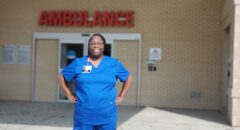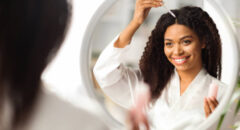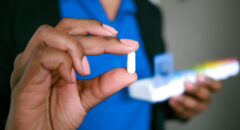 (BlackDoctor.org) — Want to boost your health, your memory, your mood, your energy, all of it! Too lazy to put very much effort into accomplishing any of that? Well, the below health tricks may be perfect for you. Yes, just about all of them do sound a bit odd, but trust us, they work!
(BlackDoctor.org) — Want to boost your health, your memory, your mood, your energy, all of it! Too lazy to put very much effort into accomplishing any of that? Well, the below health tricks may be perfect for you. Yes, just about all of them do sound a bit odd, but trust us, they work!
Yawn. Yawns are one of the best-kept secrets for flexing your mental muscles, says Andrew Newberg, M.D., associate professor of radiology at the University of Pennsylvania in Philadelphia. Brain scans reveal that yawning activates areas responsible for social awareness and feelings of empathy—which may explain why yawns are so contagious: even reading this may cause you to yawn! “They might also strengthen the precuneus, a part of the brain that plays a central role in memory retrieval and self-reflection,” Dr. Newberg says. The quick hit of oxygen wards off sleepiness and helps you stay focused by regulating metabolism and cooling the brain.
Even better. “Yawn as often as possible—in the morning, at work, before a big test,” Dr. Newberg suggests. It will give your brain an instant pick-me-up. Can’t yawn on cue? Fake it a few times and you won’t be able to help yourself.
Blink. You may consider it a cute come-hither flirtation device, but batting your eyelashes is also essential for healthy eyes. The action coats the eye with tear film, a liquid layer that washes away debris and delivers nutrients to the cornea to promote good vision.
Even better. Avoid a staring contest with your laptop, cell phone or e-reader—it can make for fewer blinks. In fact, looking at a computer made the average gal blink half as often as usual, experts at The Ohio State University at Columbus noted. “We get so absorbed in the screen that our blinking reflex goes down, causing vision to get strained and blurry,” says James Salz, M.D., clinical professor of ophthalmology at the University of Southern California in Los Angeles. Try the 20/20/20 rule: Enjoy a tech break every 20 minutes and gaze at least 20 feet into the distance for 20 seconds to relax your eyes and encourage blinking.
Breathe. Taking slow, deep breaths can help lower blood pressure and alleviate anxiety, pain and asthma symptoms. It can even prevent painful cramps during exercise. “When we’re stressed, angry or intently focused, we breathe more shallowly or hold our breath without realizing it, which can reduce the flow of oxygen and intensify our emotional and physical distress,” says Mark Gregory, M.D., an internist at Washington University in St. Louis. “Deep breathing allows airways to fully expand for an improved exchange of oxygen and carbon dioxide, releasing tension and creating a calming effect throughout the entire body,” he adds.
Even better. Place your hands on your abdomen and practice slowly inhaling through your nose and exhaling through your mouth, suggests Dennis Lewis, author of Free Your Breath, Free Your Life (Shambhala Publications). As you take in air, you should feel your belly expand. “When you exhale, do it gently through pursed lips and visualize that you’re blowing on a candle that’s several inches away so the flame is lightly flickering,” Lewis says. Repeat six or seven times and your breathing will naturally deepen. Does it get any easier than that?
Toast. That ice-cold brew at happy hour doesn’t only strengthen your resolve to chat up the cute guy or girl at the bar; it may also make your skeleton stronger. “Beer contains silicon, and diets rich in this element are associated with an increase in bone mineral density among premenopausal women,” says Ravin Jugdaohsingh, Ph.D., senior research scientist at the MRC Collaborative Centre for Human Nutrition Research in Cambridge, England. “The female hormone estrogen may act with silicon to help prevent bone loss in women.”
Even better. Brews derived from malted barley tend to contain more silicon than those that are wheat-based, according to a study from the University of California at Davis. Opt for pale ales such as India pale ales (IPAs), which were found to be the richest in silicon. But stick to one a day or you’ll cancel out any health benefits.
Nap. Our ability to learn drops by about 10 percent between the hours of noon and 6 P.M., but taking a midday snooze helped study participants reverse that decline, according to research from the University of California at Berkeley. “As the day goes on, we’re constantly learning new things,” says study author Bryce Mander, Ph.D., post-doctoral fellow in psychology. “These details are stored in the cortex of the brain and bound together in the hippocampus, a region that may have limited space and be only a temporary storage location.” So how can a siesta prevent information overload? “We believe napping may allow us to consolidate what we’ve learned, improving the hippocampus’s ability to process and store more information,” Mander says.
Even better. Limit naps to 45 minutes and avoid dozing after 4 P.M. so you don’t have trouble drifting off come bedtime and getting the seven to eight hours of nightly zzz’s experts advise. “If we haven’t slept enough at night, it can take us twice as long to do things the next day, particularly when it comes to complex thinking and information processing,” Mander explains.
Stand. This time, Mother does know best. “Good posture can help prevent muscle strain, fatigue and pain,” says Daniel Mazanec, M.D., associate director of the Center for Spine Health at the Cleveland Clinic. “It keeps back muscles long and strong, whereas hunching and slouching can shorten your muscles and lead to chronic aches that may require some formal rehabilitation.”
Even better. While standing, imagine you’re a puppet with a string coming out of the top of your head that’s pulling you upright,” Dr. Mazanec recommends. When you’re walking, focus your gaze directly ahead and pretend you’re balancing a plate on your head. And at the office, avoid leaning forward in your seat while you work by positioning your computer screen so it’s at eye level and sitting with your feet flat on the floor, knees bent at 90 degrees. Placing your keyboard so the bend in your arms is 90 degrees while you type will also encourage proper posture.
Refresh. Turns out, there really is something special in the air near the water: Ocean waves, wind and sunlight break apart air molecules and create negatively charged ions that can improve your mood. “Negative ions cling to dust in the air, making the particles heavier so they drop toward the ground, leaving the air you breathe in more oxygen-rich,” says Namni Goel, Ph.D., assistant professor in psychiatry at the University of Pennsylvania. “The antidepressant mechanism of negative ions remains unknown, although preliminary research suggests they may increase levels of serotonin, chemicals that lift your mood.” High levels of these ions were also found to treat seasonal affective disorder in a study at Columbia University in New York City.
Even better. Levels of negative ions are reliably high by the crashing surf, but sadly, not every day can be a beach day. The happy news: Outdoor air usually contains more negative ions than the stuff we breathe inside, so savor them whenever you can
by going for a walk or jog outside or simply throwing open a window.
Laugh. Feeling guilty for skipping the gym this morning? Laugh it off. “Repetitive mirthful laughter—the type of humor that pertains to the absurdities in life, rather than the demeaning kind—causes a physiological response that’s similar to the effects of moderate exercise,” says Lee S. Berk, Dr.P.H., director of the molecular research laboratory in the School of Allied Health Professions at Loma Linda University in California. Like exercise, laughing lowers the levels of cholesterol and stress hormones that suppress immunity, Berk says. “It also ups levels of dopamine, a chemical that activates your brain’s pleasure center—which is what makes laughter so enjoyable.”
Even better. Whether you’re a quiet chuckler or a raucous knee slapper, the benefits of laughing are the same. So find what tickles your funny bone (say, your favorite YouTube video) and set aside 20 to 30 minutes throughout the day to crack up. Who knows? Maybe you’ll feel so good, you’ll have the energy to do something active after all!








